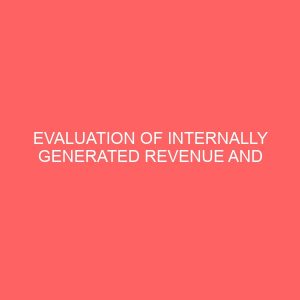Description
THIS PROJECT IS ON THE USE OF FINANCIAL ACCOUNTING AS A TOOL FOR MANAGERIAL DECISION MAKING.
CHAPTER ONE
INTRODUCTION
1.1. BACKGROUND TO THE STUDY
In recent years the advancement in accounting transaction system modules all over the world has made business organisations to exert resources in this area if they are to compete favourably among their local and foreign counterparts. Gone were the days when business organisations were simply required to make profit, survive and provide a fair return to investors’ on their interest. The modern business organisations find itself in the atmosphere of global uncertainties, cut throat competition locally and internationally and unprecedented change in the economy. Hence, a great demand is often placed on the managers of these organisations to make pragmatic and informed decisions if the organisation is to move forward as the success or otherwise of any organisation is often a function of the sum of the decisions taken in the past. However, the quality of decisions taken by managers rests upon the substance and accuracy of financial accounting information’s provided by information systems available to them.
In today’s world,Financial accounting provides the rules and structure for the conveyance of financial information about businesses (and other organizations). At any point in time, some businesses are poised to prosper while others teeter on the verge of failure. Many people are seriously interested in evaluating the degree of success achieved by a particular organization as well as its prospects for the future. While a few basic procedures or methods have changed, the purpose of financial accounting remains the same. Business owners often use accounting to measure the financial performance of their companies and make business decisions.
The American Institute of Certified Public Accountants has defined the Financial Accounting as “the art of recording, classifying and summarising in as significant manner and in terms of money transactions and events which in part, at least of a financial character, and interpreting the results thereof”. American Accounting Association defines accounting as “the process of identifying, measuring, and communicating economic information to permit informed judgements and decisions by users of the information.
It is noteworthy to say here that financial Accounting derives its source from accounting transaction data and information. Financial Accounting produces results which enhances decision making in the organisation. Hence, it can safely be concluded that Financial Accounting is not an end in itself but a means to an end .i.e. decision making to improve corporate performance, and also produces detailed and comprehensible accounting information which are invaluable basis for decision making.
Financial accounting provides data that these individuals need and wants, moreover many possible benefits can be gained from acquiring a strong knowledge of financial accounting and the means by which information is communicated about an organization. Around the world, millions of individuals make critical judgments each day about the businesses and other organizations they encounter. Developing the ability to analyze financial information and then using that knowledge to arrive at sound decisions can be critically important.
Financial Accounting is a service activity. It uses words and symbols to communicate financial information useful for decision making. The terminology and symbols used have developed from the earliest known accounting records. As a profession, accounting has evolved in response to society’s need for economic information to help people make economic decisions. It is often called the ‘language of business’. To be effective, the recipient must understand the message that the sender intends to convey. You must learn the meaning of the words and symbols used by accountants. Many people with little knowledge of accounting must interpret accounting data.
Financial Accounting is regarded as part and parcel of today’s life which is necessary to understand the accurate financial situation of the organization and used as the basis of making any decisions. Since strategic decisions have long-term effect on the business and therefore it is important to analyze accounting information for making strategic decisions, it helps managers understanding their tasks more clearly and reducing uncertainty before making their decisions (Chong, 1996). Accounting is sometimes referred to as a means to an end, with the ending being the decision that is helped by the availability of accounting information (Arneld and Hope, 1990), it also aids decision making and providing information relevant to the decision and to the decision maker, more reason why it effective and efficient financial utilization plays a central role in management decision making process.
Individuals who attain a proper level of knowledge of financial accounting can utilize this information to make decisions based on the organization’s perceived financial health and outlook. Such decisions might include assessing employment potential, lending money, granting credit, and buying or selling ownership shares. However, financial accounting does not address issues that are purely of an internal nature, such as whether an organization should buy or lease equipment or the level of pay raises. Information to guide such internal decisions is generated according to managerial accounting rules and procedures that are introduced in other books and courses. Despite not being directed toward the inner workings of an organization, employees are interested in financial accounting because it helps them assess the future financial prospects of their employer.
Financial accounting refers to the conveyance of information about an organization as a whole and is most frequently directed to assisting outside decision makers, it is also designed to portray the overall financial condition and prospects of an organization. Every employee should be quite interested in assessing that financial information to judge future organisational prospects.
Finally the ultimate purpose of this research study is to provide various users of financial accounting information with a rich understanding of the uses, benefits, and importance of financial accounting so they can evaluate available information and then make good choices for management decisions.
1.2. STATEMENT OF PROBLEM
The major purpose of the use of financial accounting information is to minimize risk, failure and uncertainties and also stay ahead of competitors. Notwithstanding the immense benefit of use of accounting information, it is generally acknowledged that most unqualified accountants generate inaccurate information and so result in failure of organizations to achieve desired goal. There are cases of managers refusing the use of accounting information because of their inability to interpret such data, thereby making the organization to remain at “status quo ante”. These problems largely contribute to the failure of the use of accounting information in business with the result that inaccurate decisions are made to the detriment of the organization.
Managers of certain businesses do not have sound accounting systems to enable them monitor operating expenses and revenues. They do not need the warings communicated by financial accounting information. This ignorance or lack of financial accounting information, may lead to the non-effective and inefficient accomplishment of the firm’s objectives, It is only through accounting information that managers and external users get a picture of the organization as a total entity. Managers who fail to realize this do not appreciate an accountants analysis in respect of financial accounting information generated. This may lead to poor decisions being taken and it may affect the profitability and performance of the organization.
Furthermore, Inspite of the fact that convention of objectivity is respected in accounting but to record certain events estimates have to be made which requires personal judgement. It is very difficult to expect accuracy in future estimates and objectivity suffers. For example, in order to determine the amount of depreciation to be charged every year for the use of fixed asset it is required to estimate (a) future life of the asset, and (b) scrap value of the asset. Thus in accounting we do not determine but measure the income.
Most profit making organizations in Nigeria are however, often encountered with accounting and financial management challenges. Poor record keeping, inefficient use of accounting information to support their financial decision-making and the low quality and reliability of financial data are part of the main problems in financial management concerns of these companies.
(Adeboye 2005) While proper accounting is a useful system for making sound economic decisions, The misuse, untimely, poor record keeping, and inaccuracy of accounting information also causes most firm’s to implement and make poor financial decisions, these short comings might be the cause of difficulties to succeed and to raise fund or borrow money during the later stage. In the worst case, might face with the failure and perhaps bankruptcy in the end.
Finally, Based on the fact that the financial accounting is one of the social sciences which aim to serve various needs of the private and public business facilities, it is affected by the changes of the general economic, social, legal and political and political conditions prevailing in each country or certain environment at each period. The accounting information is resulted by certain requirements which change due to various environmental factors within the economic, social, legal and political environments in which the accountancy works.
1.3. OBJECTIVES OF THE STUDY
As a central objective, this study seeks to evaluate the use of Financial Accounting as tools for management in decisions making in an organization. But more specifically, it attempts to achieve the following:
1. Find the causes of failure in the attainment of organization objective, resulting from lack of adequate utilization of accounting information.
2. Explain what accounting information is necessary, who are the users and the various ways each of these users utilize the information and the benefits derivable from them.
3. Highlight the effects of managerial neglect of accounting information on the achievement of the organizational goal.
4. To ascertain the extent to which Accounting is being used as a financial tool for measuring financial performance of organisation.
5. Analyze the relationship between financial accounting, accounting information and management decision making.
6. Determine the effectiveness of Accounting Department of the organization in decision making of management of organisations.
1.4. RESEARCH QUESTION
The research question provides a framework and guidelines through which substantial knowledge of the research study can be understood.
The research question asked includes:
1. What are the causes of failure in the attainment of organization objective, resulting from lack of adequate utilization of accounting information.
2. What accounting information is necessary and who are the users are and the various ways each of these users utilize the information and the benefits derivable from them.
3. What the effects of managerial neglect of accounting information on the achievement of the organizational goal.
4. To what extent is financial Accounting being used as a financial tool for measuring financial performance of organisation.
5. Is there any relationship between financial accounting, accounting information and management decision making.
6. Effectiveness of Accounting Department of the organization in decision making of management of organisations.
1.5. STATEMENT OF HYPOTHESIS
The Statement of Hypothesis is “a speculation of the way the variables of study behaves” it is a guide method to be used in their analysis. The needs for such guides rise to the following hypothesis;
The hypotheses are stated in the null form for testing:
Hypothesis one
Hi: Financial Accounting is not a practical tool for efficient and effective management of decisions in an organization
Hypothesis Two
Hi: Financial Accounting do not plays a significant role in management financial decision making role.
1.6. SIGNIFICANCE OF THE STUDY
The significance of this study was to create through documentation, an awareness, benefit and the importance of financial accounting as a veritable tools for management decision making in the organization, both financially and economically.
Accounting is increasingly seen as a social rather than a pure technical phenomenon as it is implicated in both organizational and social contexts (Hopwood, 1985). Following this notion, this study is inspired by the desire to understand the potential context of the use of financial accounting in an organization planning, control and management decision making, A study of this nature is mostly important in relation to developing countries like Nigeria.
This study will be of great importance to the government, corporate individual, financial and non-financial institution since it will help to determine the actual roles played by accounting department of this financial institution, as it will also provide indepth knowledge on the duties and responsibilities of the accountant.
This paper would offer useful insights on the usefulness of financial accounting as a concept, accounting information, and also provide a contextual framework for researchers on the relationship of financial accounting with other aspect of accounting in an organization.
Finally it will be of great significance to schools and students, it will serve as a reference point for future researchers who will want to research more on the topic.
1.7. SCOPE OF THE STUDY
The study builts around the implicit use of financial accounting for management decision making in an organizations, in Nigeria.((by making use of Access Bank Plc, as a case study.)
However, the research was limited to Access Bank Plc operator in Sagamu, Ogun State metropolis due the schedule and vicinity of the researcher.
1.8. LIMITATION OF THE STUDY
Limitations envisage in this research work are
1. Restriction on data generation: the data obtained was restricted to the case study
2. Time frame of this research work is another limitation as more time may be required to make more findings, because adequate time will be required to get up to date current data from the bank and the clients.
3. Distribution and retrieval of questionnaires from respondents (banks official and the clients) might also constitute limitation as we may not be able to retrieve all questionnaires.
4. Also there might be financial and transportation constraints to this study as these two factors will be at our capacity which might not be enough to give us desired results.
1.9. DEFINITION OF TERMS
1. Financial Accounting: Financial accounting is concerned with reporting general-purpose information to users external to an entity in order to help them make sound economic decisions about the entity’s performance and financial position. It also deals with the maintenance of books of accounts with a view to ascertain the profitability and the financial status of the business.
2. Decision-Making: Decision making can be defined as identifying alternatives, evaluating such alternatives and choosing from such alternatives. Decision making can be viewed as the very fabric of which organized activity is made.
3. Financial Accountant: The role of a financial accountant is to record, summarise and report on the financial transactions of an organisation in such a way that it is possible for someone outside of the organisation to get an accurate picture of the organisation’s financial position and performance
4. Accountant: An accountant is any person who possesses a professional license to practice accountancy from a recognized professional body and has legal capacity and authority to carryout the duties of accountants in taxation and audit practice.
5. Financial statement: A financial statement (or financial report) is a formal record of the financial activities of a business, person, or other entity.It alsoprovide information regarding the position and performance of a business, such as its assets, liabilities, equity, income, expenses and cash flow.
6. Management: This is the process by which business systems are administered. It is also a process of planning, controlling and decision-making in an organization.
7. Company: This refers to a legal entity that carryout business in its name.
8. Business strategy: An integrated set of plans and actions designed to enable the business to gain an advantage over its competitors and, in doing so, maximize its profits.
9. Book-keeping: It is the art of recording in the books of accounts the monetary aspect of commercial or financial transactions.
10. Transaction: A transaction is a stimulus from one person and a related response from another.








Reviews
There are no reviews yet.